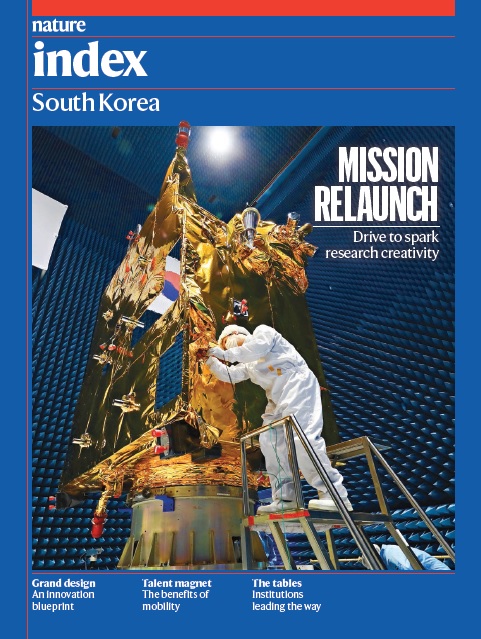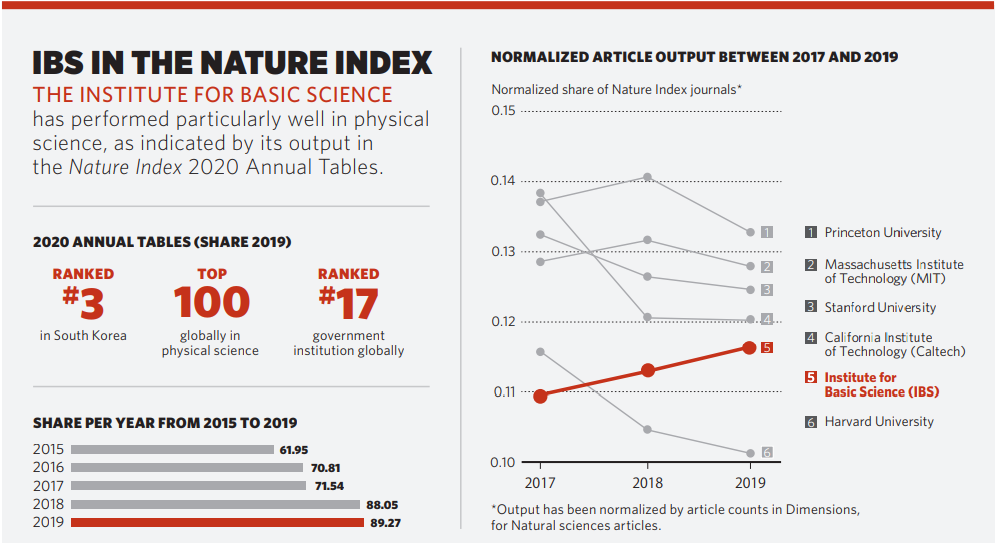주메뉴
- About IBS 연구원소개
-
Research Centers
연구단소개
- Research Outcomes
- Mathematics
- Physics
- Center for Underground Physics
- Center for Theoretical Physics of the Universe(Particle Theory and Cosmology Group)
- Center for Theoretical Physics of the Universe(Cosmology, Gravity and Astroparticle Physics Group)
- Center for Exotic Nuclear Studies
- Dark Matter Axion Group
- Center for Artificial Low Dimensional Electronic Systems
- Center for Theoretical Physics of Complex Systems
- Center for Quantum Nanoscience
- Center for Van der Waals Quantum Solids
- Center for Relativistic Laser Science
- Chemistry
- Life Sciences
- Earth Science
- Interdisciplinary
- Center for Neuroscience Imaging Research(Neuro Technology Group)
- Center for Neuroscience Imaging Research(Cognitive and Computational Neuroscience Group)
- Center for Algorithmic and Robotized Synthesis
- Center for Genome Engineering
- Center for Nanomedicine
- Center for Biomolecular and Cellular Structure
- Center for 2D Quantum Heterostructures
- Center for Quantum Conversion Research
- Institutes
- Korea Virus Research Institute
- News Center 뉴스 센터
- Career 인재초빙
- Living in Korea IBS School-UST
- IBS School 윤리경영


주메뉴
- About IBS
-
Research Centers
- Research Outcomes
- Mathematics
- Physics
- Center for Underground Physics
- Center for Theoretical Physics of the Universe(Particle Theory and Cosmology Group)
- Center for Theoretical Physics of the Universe(Cosmology, Gravity and Astroparticle Physics Group)
- Center for Exotic Nuclear Studies
- Dark Matter Axion Group
- Center for Artificial Low Dimensional Electronic Systems
- Center for Theoretical Physics of Complex Systems
- Center for Quantum Nanoscience
- Center for Van der Waals Quantum Solids
- Center for Relativistic Laser Science
- Chemistry
- Life Sciences
- Earth Science
- Interdisciplinary
- Center for Neuroscience Imaging Research(Neuro Technology Group)
- Center for Neuroscience Imaging Research(Cognitive and Computational Neuroscience Group)
- Center for Algorithmic and Robotized Synthesis
- Center for Genome Engineering
- Center for Nanomedicine
- Center for Biomolecular and Cellular Structure
- Center for 2D Quantum Heterostructures
- Center for Quantum Conversion Research
- Institutes
- Korea Virus Research Institute
- News Center
- Career
- Living in Korea
- IBS School
News Center
| Title | Nature Index 2020 says decisions on the Korea’s basic research flagship will point to national priorities. | ||||
|---|---|---|---|---|---|
| Name | 전체관리자 | Registration Date | 2020-06-08 | Hits | 2583 |
| att. |
 thumb.jpg
thumb.jpg
|
||||
From basic to breakthrough: IBS, Korea’s answer to MPI and RIKEN
IBS, nation’s answer to MPI and RIKENIn its May 28th issue, the journal Nature featured the 「Nature Index(NI) 2020 South Korea」. While looking to South Korea’s strategy to become a “first mover”, the journal featured IBS as the nation’s answer to Germany’s Max Planck Society and Japan’s RIKEN. The special report demonstrated how a concentrated government push enabled South Korea to become an innovative leader as demonstrated by its fairly well maintained NI rankings. According to the NI 2020, South Korea has retained its positions in the top 10 countries in terms of high quality research papers. The country is seen to be faring better than most amidst a substantial and intensive research investment from China. First to crack the genomic secret to a novel CoronavirusNature attributed Korea’s rapid and long-lasting economic and scientific transformation to its ‘top-down’ planning. Notably, as South Korea’s highest-profile investment in basic research, it featured IBS as a national vision to bring world’s top scientists and grant them full autonomy of research. The nation’s first basic science flagship has yielded quite significant triumphs. For instance, in March 2020, the IBS Center for RNA Research at Seoul National University became one of the first research groups in the world to sequence the transcriptome — the total product of all expressed genes — of the coronavirus that caused the COVID-19 pandemic (Cell, April 2020). Narry Kim, a biochemist and the center’s director, says the work required an interdisciplinary team of virologists, microbiologists and computational scientists, which was enabled by IBS’s steady support. “Without IBS funding, I don’t think it would have been possible,” she says. Mutation correction, a discovery on the origin of the universe and of modern humansIBS’ strong and stable support resulted in prominent scientific breakthroughs: IBS Center for Genome Engineering reported the correction of a disease-causing mutation in human embryos. The IBS scientists used the groundbreaking gene-editing tool CRISPR-Cas9 to repair the DNA piece that causes a common genetic heart disease, furthering medical advances. (Nature, August 2017). As for research that has contributed to creating new knowledge of humanity, the IBS Center for Underground Physics reported data that significantly challenged the long-standing claim of dark-matter induced events. The COSINE-100 Experiment built a detector with enough sensitivity to require a new dark-matter model, bringing the world closer to discovering the origin of the universe. (Nature, December 2018). Also, the IBS Center for Climate Physics (ICCP) pinpointed the birthplace of modern humans (Nature, October 2019).
From basic to breakthroughIn fewer than 10 years, IBS has evolved from an idea to a multi-disciplinary web of 30 research centers. In the 2020 NI Annual Tables, IBS ranked as the number 1 national institution and within the top 20 of global government institutions. 2020, marks a turning point for IBS and South KoreaThe special report notes that South Korean science is at a critical point as the first eight IBS centers are up for review to continue beyond the year 2020. It describes this landmark decision will also shape the national scientific landscape: whether the country will continue to push its pledge to become a “first mover”. Andreas Heinrich, director of the IBS Center for Quantum Nanoscience in Seoul says, “I like that pressure.” He adds, “If I cannot build a top-class research center in eight years, either I’m not the right person for the job, or it’s not possible in that environment.” |
|||||
| Next | |
|---|---|
| Next |
- Content Manager
- Public Relations Team : Yim Ji Yeob 042-878-8173
- Last Update 2023-11-28 14:20













